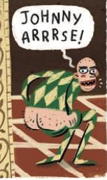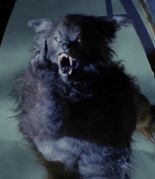- OscarDiggs
- Jun 1, 2011
-

Those sure are words on pages which are given in a sequential order!
|
I've always found it's 50% shitposting and trolling and 50% genuine love of the subject matter with an eagerness to share in that love. Which is a pretty decent ratio as far as I am concerned.
|
 #
?
Sep 7, 2018 20:46
#
?
Sep 7, 2018 20:46
|
|
- Adbot
-
ADBOT LOVES YOU
|

|
|
#
?
Apr 26, 2024 21:51
|
|
- CestMoi
- Sep 16, 2011
-

|
you're thinking of meter in general, not pentameter specifically. 'meter' means any pattern of stressed and unstressed syllables; the 'penta' prefix just means 5 (see also pentagram). you're right that shakespeare usually writes in iambic pentameter; his verse lines have 5 "iambs". an iamb is an unstressed syllable followed by a stressed syllable.
Stress is what word or what syllable in a word you emphasize. Here's an illustration.
Try it: say the words 'emphasis' and 'syllable' out loud. I'm betting you say something like EM-pha-sis and SYL-a-ble; that is, "em" and "syl" are stressed syllables. The humor in that clip comes from Mike Myers instead saying em-PHA-sis and syl-A-ble; he's stressing the wrong syllables.
here i've marked the stressed syllables from a line of shakespeare in bold, so you can see what i mean:
but soft! what light through yonder window breaks
try saying it out loud, and you'll get a feel for how the stresses fall ("but SOFT" instead of "BUT soft"). it comes out as something like "da-DUM da-DUM da-DUM da-DUM da-DUM". each of those stressed-unstressed combinations is one iamb.
you can also have Dactylic pentameter but there's no real need to go down that rabbit hole.
different poets will use different meters in different poems; robert frost's The Road Not Taken, for examble, still uses iambs, but uses them in tetrameter, so four iambs per line instead of five.
anyway, defining what is and isn't poetry is one of those questions, like defining what is and isn't art, that has the potential to piss a lot of people off and is simultaneously. there also isn't always a clear line. Billy Collins, the former US Poet Laureate, writes in what's called free verse - verse without any meter or rhyme. you can see an example here. Bukowski also writes in free verse. sometimes you'll find people saying that the only thing that makes a poem a poem is the use of line breaks, but there's something called 'prose poetry', which doesn't even have that; Poe wrote this batshit thing that he titled "Eureka: A Prose Poem", for example, and it doesn't rhyme, stick to a meter, or use line breaks.
just read it, and read it slowly. you'll find yourself falling into the rhythm of the poem naturally.
you could definitely pick up a book, like Perinne's sound and sense, that will teach you all about different kinds of meters and whatnot, but i really don't think that's necessary to understand a poem or derive enjoyment from it. you can find a lot of pleasure and meaning in Ozymandias without knowing that it's a sonnet in iambic pentameter.
errr yeah basically this
|
 #
?
Sep 7, 2018 20:56
#
?
Sep 7, 2018 20:56
|
|
- CestMoi
- Sep 16, 2011
-

|
I find that a really good way to get a grip of basic meter is to read highly structured verse, with a favourite being double dactyls. A dactyl is stressed-unstressed-unstressed (DUM da da) and double dactyls are poems of 6 lines of 6 syllables (stressed-unstressed-unstressed stressed-unstressed-unstressed) and 2 lines of 4 syllables going stressed-unstressed-unstressed-stressed with the first line being nonsense, the second line being a title of the poem, the seventh line being a single double dactylic word, and the fourth and eighth lines rhyming. This sounds difficult but a few examples should help:
Higgledy piggledy,
Benjamin Harrison,
Twenty-third president
Was, and, as such,
Served between Clevelands and
Save for this trivial
Idiosyncrasy,
Didn't do much.
Battery Flattery
Trial of the century
This man’s been found making
Youth’s brains enlarged
He offers no defence
And so our judge declares
Apologetically
“Guilty as charged!”
Any two fluent speakers of English are going to read those poems (out loud ofc) with almost exactly the same rhythm and delivery. That's meter. Now the extent to which meter is useful to poetry is pretty contentious, but the general idea is that certain meters give poems certain sorts of feelings. Double dactyls are inherently quite comic, that's just how they move. Something like a sonnet in iambic pentameter tends to seem very romantic and cliché in English, which is what makes Shakespeare's more satirical sonnets work in the way they do. Poetry is exactly about this interplay of what the words say, what they sound like, and what associations those sounds bring. This is why people that say poetry is prose with line breaks are disgusting idiots, and any poet who claims to write actually free verse is a charlatan. If the rhythm and sound of your words isn't vitally important to their meaning, you're not a poet.
|
 #
?
Sep 7, 2018 21:16
#
?
Sep 7, 2018 21:16
|
|
- Tree Goat
- May 24, 2009
-

argania spinosa
|
this is all a trick to get you to yell poems to yourself out loud all the time until you completely alienate yourself from civilized society btw
|
 #
?
Sep 7, 2018 21:52
#
?
Sep 7, 2018 21:52
|
|
- CestMoi
- Sep 16, 2011
-

|
It makes sense to do that in this, the Sufism thread
|
 #
?
Sep 8, 2018 00:12
#
?
Sep 8, 2018 00:12
|
|
- A human heart
- Oct 10, 2012
-

|
this is all a trick to get you to yell poems to yourself out loud all the time until you completely alienate yourself from civilized society btw
the joke's on you pal, i'm already alienated from civilized society
|
 #
?
Sep 8, 2018 01:42
#
?
Sep 8, 2018 01:42
|
|
- A human heart
- Oct 10, 2012
-

|
what's the cool William Blake to read if i've never read anything by him btw?
|
 #
?
Sep 8, 2018 01:42
#
?
Sep 8, 2018 01:42
|
|
- CestMoi
- Sep 16, 2011
-

|
Songs of innocence and experience are a pretty nice intro if youre stupid but if you want the primo poo poo just read Jerusalem (the book not the shite song)
|
 #
?
Sep 8, 2018 02:00
#
?
Sep 8, 2018 02:00
|
|
- this broken hill
- Apr 10, 2018
-

by Lowtax
|
I've always found it's 50% shitposting and trolling and 50% genuine love of the subject matter with an eagerness to share in that love. Which is a pretty decent ratio as far as I am concerned.
|
 #
?
Sep 8, 2018 02:05
#
?
Sep 8, 2018 02:05
|
|
- this broken hill
- Apr 10, 2018
-

by Lowtax
|
ya this but also read it on http://blakearchive.org/ so you can read them as they were meant to be read: as part of a bugfuck crazy series of prints engraved and inked by a lunatic
|
 #
?
Sep 8, 2018 02:56
#
?
Sep 8, 2018 02:56
|
|
- Tree Goat
- May 24, 2009
-

argania spinosa
|
pro loving click
|
 #
?
Sep 8, 2018 03:23
#
?
Sep 8, 2018 03:23
|
|
- A human heart
- Oct 10, 2012
-

|
ty, this is good because the complete poems i have just has a thing like 'plate here' where the artworks are supposed to be
|
 #
?
Sep 8, 2018 05:30
#
?
Sep 8, 2018 05:30
|
|
- Vogler
- Feb 6, 2009
-
|
I picked up the only poetry anthology I could find in a used bookstore in Bangkok, The Rag and Bone Shop of the Heart, edited by Robert Bly and others. There is something very corny about Robert Bly, but I think he is a good translator. I liked his version of Walking Around by Neruda better than WS Merwin's. Here it is:
Walking around
It so happens I am sick of being a man.
And it happens that I walk into tailorshops and movie houses
dried up, waterproof, like a swan made of felt
steering my way in a water of wombs and ashes.
The smell of barbershops makes me break into hoarse sobs.
The only thing I want is to lie still like stones or wool.
The only thing I want is to see no more stores, no gardens,
no more goods, no spectacles, no elevators.
It so happens I am sick of my feet and my nails
and my hair and my shadow.
It so happens I am sick of being a man.
Still it would be marvelous
to terrify a law clerk with a cut lily,
or kill a nun with a blow on the ear.
It would be great
to go through the streets with a green knife
letting out yells until I died of the cold.
I don’t want to go on being a root in the dark,
insecure, stretched out, shivering with sleep,
going on down, into the moist guts of the earth,
taking in and thinking, eating every day.
I don’t want so much misery.
I don’t want to go on as a root and a tomb,
alone under the ground, a warehouse with corpses,
half frozen, dying of grief.
That’s why Monday, when it sees me coming
with my convict face, blazes up like gasoline,
and it howls on its way like a wounded wheel,
and leaves tracks full of warm blood leading toward the night.
And it pushes me into certain corners, into some moist houses,
into hospitals where the bones fly out the window,
into shoeshops that smell like vinegar,
and certain streets hideous as cracks in the skin.
There are sulphur-colored birds, and hideous intestines
hanging over the doors of houses that I hate,
and there are false teeth forgotten in a coffeepot,
there are mirrors
that ought to have wept from shame and terror,
there are umbrellas everywhere, and venoms, and umbilical cords.
I stroll along serenely, with my eyes, my shoes,
my rage, forgetting everything,
I walk by, going through office buildings and orthopedic shops,
and courtyards with washing hanging from the line:
underwear, towels and shirts from which slow
dirty tears are falling.
|
 #
?
Sep 16, 2018 16:36
#
?
Sep 16, 2018 16:36
|
|
- perfluorosapien
- Aug 15, 2015
-

-
Oven Wrangler
|
Since the thread loves translated poetry, I'm curious if anyone can find the reference in this passage from Nabokov's Pale Fire. One line is a literal translation taken from another poem, and it's not just trivia - the effect is really neat when you spot it.
For background, this is right in the middle of a long poem embedded in a novel. The fictional author, John Shade, is addressing his wife, who has some of the dialog.
Vladimir Nabokov posted:
That tasteless venture helped me in a way,
I learnt what to ignore in my survey
of death's abyss.
And when we lost our child,
I knew there would be nothing. No self-styled
spirit wold touch a keyboard of dry wood
to rap out her pet name. No phantom would
rise gracefully to welcome you and me
in the dark garden, near the shagbark tree.
"What is that funny creaking? Do you hear?"
"It is the shutter on the stairs my dear."
"If you're not sleeping, let's turn on the light."
"I hate that wind." "Let's play some chess." "Alright."
"I swear it's not the shutter. There, again!"
"It is a tendril fingering the pane."
"What glided down the roof and made that thud?"
"It is old winter tumbling in the mud."
"And now what shall I do? My knight is pinned."
Who rides so late in the night and the wind?
It is the writer's grief. It is the wild
March wind. It is the father with his child.
Later came minutes, hours, whole days, at last,
when she'd be absent from our thoughts, so fast
did life, the woolly caterpillar run.
|
 #
?
Sep 26, 2018 00:45
#
?
Sep 26, 2018 00:45
|
|
- Tree Goat
- May 24, 2009
-

argania spinosa
|
i'm sad that mary oliver died, so there
quote:
You do not have to be good.
You do not have to walk on your knees
for a hundred miles through the desert repenting.
You only have to let the soft animal of your body
love what it loves.
Tell me about despair, yours, and I will tell you mine.
Meanwhile the world goes on.
Meanwhile the sun and the clear pebbles of the rain
are moving across the landscapes,
over the prairies and the deep trees,
the mountains and the rivers.
Meanwhile the wild geese, high in the clean blue air,
are heading home again.
Whoever you are, no matter how lonely,
the world offers itself to your imagination,
calls to you like the wild geese, harsh and exciting -
over and over announcing your place
in the family of things.
|
 #
?
Jan 21, 2019 03:31
#
?
Jan 21, 2019 03:31
|
|
- suspendedreason
- Dec 5, 2018
-

|
Annie B., "What Resembles the Grave but Isn’t"
"What Resembles The Grave But Isn't posted:Always falling into a hole, then saying “ok, this is not your grave, get out of this hole,” getting out of the hole which is not the grave, falling into a hole again, saying “ok, this is also not your grave, get out of this hole,” getting out of that hole, falling into another one; sometimes falling into a hole within a hole, or many holes within holes, getting out of them one after the other, then falling again, saying “this is not your grave, get out of the hole”; sometimes being pushed, saying “you can not push me into this hole, it is not my grave,” and getting out defiantly, then falling into a hole again without any pushing; sometimes falling into a set of holes whose structures are predictable, ideological, and long dug, often falling into this set of structural and impersonal holes; sometimes falling into holes with other people, with other people, saying “this is not our mass grave, get out of this hole,” all together getting out of the hole together, hands and legs and arms and human ladders of each other to get out of the hole that is not the mass grave but that will only be gotten out of together; sometimes the willful-falling into a hole which is not the grave because it is easier than not falling into a hole really, but then once in it, realizing it is not the grave, getting out of the hole eventually; sometimes falling into a hole and languishing there for days, weeks, months, years, because while not the grave very difficult, still, to climb out of and you know after this hole there’s just another and another; sometimes surveying the landscape of holes and wishing for a high quality final hole; sometimes thinking of who has fallen into holes which are not graves but might be better if they were; sometimes too ardently contemplating the final hole while trying to avoid the provisional ones; sometimes dutifully falling and getting out, with perfect fortitude, saying “look at the skill and spirit with which I rise from that which resembles the grave but isn’t!”
|
 #
?
Jan 26, 2019 05:21
#
?
Jan 26, 2019 05:21
|
|
- chernobyl kinsman
- Mar 18, 2007
-

a friend of the friendly atom

-
Soiled Meat
|
no one gives a. e. housman's very goth poem 'her strong enchantments failing' enough credit for how kickin rad it is
quote:
Her strong enchantments failing,
Her towers of fear in wreck,
Her limbecks dried of poisons
And the knife at her neck,
The Queen of air and darkness
Begins to shrill and cry,
'O young man, O my slayer,
To-morrow you shall die.'
O Queen of air and darkness,
I think 'tis truth you say,
And I shall die tomorrow;
But you will die to-day.
|
 #
?
Jan 29, 2019 07:03
#
?
Jan 29, 2019 07:03
|
|
- CestMoi
- Sep 16, 2011
-

|
bump
|
 #
?
May 12, 2019 14:54
#
?
May 12, 2019 14:54
|
|
- Bandiet
- Dec 31, 2015
-

|
I've been reading D'Annunzio. "Notturne" and his novels are very good, but the only English translation of his poetry I can find is Alcyone by J.G. Nichols. Someone should translate the whole rest of his Laudi for me, thanks.
quote:"The Victory of Samothrace"
If she, whose spreading wings both arm and honour
that trireme's prow sailing from Samothrace,
is speeding now to me who know no peace
persisting with my twice-ten-years' hard labour,
nowhere but here where masts and yard-arms prosper,
this coastal pine-wood born of summer's blaze
below the solid Alp whose silent face
is glorious in its everlasting candour,
shall I give greeting: 'You are right to come
here from that shore which hosts the Càbiri,
here from that isle against the Hebrus River.
The Greeks acknowledge me their latest son:
I sucked the dugs of all antiquity;
and still a fiery daemon makes me quiver.' quote:"The vulture of the Sun"
When at odd times I ponder, and regard
the salt air flickering, a sheet of flame,
and in the silence hear the falling pine's
dull thud, the resin spluttering in the tead,
the flautist of the marsh sound from his mud,
the sedge and millet still at their dry din,
then suddenly you seize this heart of mine,
you prey upon me trembling and afraid,
O Glory, Glory, vulture of the Sun,
who swoop on me and grasp me in your claws
even on this hot seashore where I hide!
I raise my face, although my heart is down,
and through the redness of the eyes I close
I see a world resplendent in my blood.
|
 #
?
May 13, 2019 03:03
#
?
May 13, 2019 03:03
|
|
- cda
- Jan 2, 2010
-

by Hand Knit
|
I really like Tony Hoagland. He died last year.
Two Trains
Tony Hoagland
Then there was that song called “Two Trains Running,”
A Mississippi blues they play on late-night radio,
that program after midnight called FM in the AM,
–well, I always thought it was about trains.
Then somebody told me it was about what a man and woman do
under the covers of their bed, moving back and forth
like slow pistons in a shiny black locomotive,
the rods and valves trying to stay coordinated
long enough that they will “get to the station”
at the same time. And one of the trains
goes out of sight into the mountain tunnel,
but when they break back into the light
the other train has somehow pulled ahead,
the two trains running like that, side by side,
first one and then the other, with the fierce white
bursts of smoke puffing from their stacks,
into a sky so sharp and blue you want to die.
So then for a long time I thought the song was about sex.
But then Mack told me that all train songs
are really about Jesus, about how the second train
is shadowing the first, so He walks in your footsteps
and He watches you from behind, He is running with you,
He is your brakeman and your engineer,
your coolant and your coal,
and He will catch you when you fall,
and when you stall He will push you through
the darkest mountain valley, up the steepest hill,
and the rough chuff chuff of his fingers on the washboard
and the harmonica woo woo is the long soul cry by which He
pulls you through the bloody tunnel of the world.
So then I thought the two trains song was a gospel song.
Then I quit my job in Santa Fe and Sharon drove
her spike heel through my heart
and I got twelve years older and Dean moved away,
and now I think the song might be about good-byes–
because we are not even in the same time zone,
or moving at the same speed, or perhaps even
headed toward the same destination–
forgodsakes, we are not even trains!
What grief it is to love some people like your own
blood, and then to see them simply disappear;
to feel time bearing us away
one boxcar at a time.
And sometimes, sitting in my chair
I can feel the absence stretching out in all directions–
like the deaf, defoliated silence
just after a train has thundered past the platform,
just before the mindless birds begin to chirp again
–and the wildflowers that grow beside the tracks
wobble wildly on their little stems,
then gradually grow still and stand
motherless and vertical in the middle of everything.
|
 #
?
May 15, 2019 02:39
#
?
May 15, 2019 02:39
|
|
- Hieronymous Alloy
- Jan 30, 2009
-

Why! Why!! Why must you refuse to accept that Dr. Hieronymous Alloy's Genetically Enhanced Cream Corn Is Superior to the Leading Brand on the Market!?!


-
Morbid Hound
|
https://twitter.com/lake_scum/status/1127982075611578369
Anyway,
My dad read me this poem when I was a kid and I always enjoyed it. I'm interested in thoughts/criticisms about it.




It's opening verse is firmly etched in my memory, probably thanks the the sing-song rhythm, which was (apparently) inspired by Rudyard Kipling.
Any other poems I'd like?
Thanks for posting this, I hadn't seen before and yeah it's great. I think there's a specific kipling poem it's imitating but I'm not sure which one . Hrm.
maybe
https://www.poetryloverspage.com/poets/kipling/mandalay.html
maybe
https://www.bartleby.com/364/121.html
I also recommend Orwell's essay on Kipling every time Kipling's mentioned: https://www.george-orwell.org/Rudyard_Kipling/0.html
quote:
One can, perhaps, place
Kipling more satisfactorily than by juggling with the words 'verse' and
'poetry', if one describes him simply as a good bad poet. He is as a poet
what Harriet Beecher Stowe was as a novelist. And the mere existence of
work of this kind, which is perceived by generation after generation to
be vulgar and yet goes on being read, tells one something about the age
we live in.
. . . .
The merit of a poem like 'When all the world
is young, lad' is that, however sentimental it may be, its sentiment is
'true' sentiment in the sense that you are bound to find yourself
thinking the thought it expresses sooner or later; and then, if you
happen to know the poem, it will come back into your mind and seem better
than it did before. Such poems are a kind of rhyming proverb, and it is a
fact that definitely popular poetry is usually gnomic or sententious. One
example from Kipling will do:
White hands cling to the bridle rein,
Slipping the spur from the booted heel;
Tenderest voices cry 'Turn again!'
Red lips tarnish the scabbarded steel:
Down to Gehenna or up to the Throne,
He travels the fastest who travels alone.
There is a vulgar thought vigorously expressed. It may not be true, but
at any rate it is a thought that everyone thinks. Sooner or later you
will have occasion to feel that he travels the fastest who travels alone,
and there the thought is, ready made and, as it were, waiting for you. So
the chances are that, having once heard this line, you will remember it.
Hieronymous Alloy fucked around with this message at 15:36 on May 15, 2019
|
 #
?
May 15, 2019 15:23
#
?
May 15, 2019 15:23
|
|
- CestMoi
- Sep 16, 2011
-

|
kipling is just a racist edward lear
|
 #
?
May 15, 2019 17:41
#
?
May 15, 2019 17:41
|
|
- CestMoi
- Sep 16, 2011
-

|
I
They went to sea in a Sieve, they did,
In a Sieve they went to sea:
In spite of all their friends could say,
On a winter’s morn, on a stormy day,
In a Sieve they went to sea!
And when the Sieve turned round and round,
And every one cried, ‘You’ll all be drowned!’
They called aloud, ‘Our Sieve ain’t big,
But we don’t care a button! we don’t care a fig!
In a Sieve we’ll go to sea!’
Far and few, far and few,
Are the lands where the Jumblies live;
Their heads are green, and their hands are blue,
And they went to sea in a Sieve.
II
They sailed away in a Sieve, they did,
In a Sieve they sailed so fast,
With only a beautiful pea-green veil
Tied with a riband by way of a sail,
To a small tobacco-pipe mast;
And every one said, who saw them go,
‘O won’t they be soon upset, you know!
For the sky is dark, and the voyage is long,
And happen what may, it’s extremely wrong
In a Sieve to sail so fast!’
Far and few, far and few,
Are the lands where the Jumblies live;
Their heads are green, and their hands are blue,
And they went to sea in a Sieve.
III
The water it soon came in, it did,
The water it soon came in;
So to keep them dry, they wrapped their feet
In a pinky paper all folded neat,
And they fastened it down with a pin.
And they passed the night in a crockery-jar,
And each of them said, ‘How wise we are!
Though the sky be dark, and the voyage be long,
Yet we never can think we were rash or wrong,
While round in our Sieve we spin!’
Far and few, far and few,
Are the lands where the Jumblies live;
Their heads are green, and their hands are blue,
And they went to sea in a Sieve.
IV
And all night long they sailed away;
And when the sun went down,
They whistled and warbled a moony song
To the echoing sound of a coppery gong,
In the shade of the mountains brown.
‘O Timballo! How happy we are,
When we live in a sieve and a crockery-jar,
And all night long in the moonlight pale,
We sail away with a pea-green sail,
In the shade of the mountains brown!’
Far and few, far and few,
Are the lands where the Jumblies live;
Their heads are green, and their hands are blue,
And they went to sea in a Sieve.
V
They sailed to the Western Sea, they did,
To a land all covered with trees,
And they bought an Owl, and a useful Cart,
And a pound of Rice, and a Cranberry Tart,
And a hive of silvery Bees.
And they bought a Pig, and some green Jack-daws,
And a lovely Monkey with lollipop paws,
And forty bottles of Ring-Bo-Ree,
And no end of Stilton Cheese.
Far and few, far and few,
Are the lands where the Jumblies live;
Their heads are green, and their hands are blue,
And they went to sea in a Sieve.
VI
And in twenty years they all came back,
In twenty years or more,
And every one said, ‘How tall they’ve grown!’
For they’ve been to the Lakes, and the Torrible Zone,
And the hills of the Chankly Bore;
And they drank their health, and gave them a feast
Of dumplings made of beautiful yeast;
And everyone said, ‘If we only live,
We too will go to sea in a Sieve,—
To the hills of the Chankly Bore!’
Far and few, far and few,
Are the lands where the Jumblies live;
Their heads are green, and their hands are blue,
And they went to sea in a Sieve.
|
 #
?
May 15, 2019 17:41
#
?
May 15, 2019 17:41
|
|
- Selachian
- Oct 9, 2012
-

|
You can't post "The Cremation of Sam McGee" and not include Service's other most famous poem, "The Shooting of Dan McGrew."
quote:A bunch of the boys were whooping it up in the Malamute saloon;
The kid that handles the music-box was hitting a jag-time tune;
Back of the bar, in a solo game, sat Dangerous Dan McGrew,
And watching his luck was his light-o'-love, the lady that's known as Lou.
When out of the night, which was fifty below, and into the din and the glare,
There stumbled a miner fresh from the creeks, dog-dirty, and loaded for bear.
He looked like a man with a foot in the grave and scarcely the strength of a louse,
Yet he tilted a poke of dust on the bar, and he called for drinks for the house.
There was none could place the stranger's face, though we searched ourselves for a clue;
But we drank his health, and the last to drink was Dangerous Dan McGrew.
There's men that somehow just grip your eyes, and hold them hard like a spell;
And such was he, and he looked to me like a man who had lived in hell;
With a face most hair, and the dreary stare of a dog whose day is done,
As he watered the green stuff in his glass, and the drops fell one by one.
Then I got to figgering who he was, and wondering what he'd do,
And I turned my head — and there watching him was the lady that's known as Lou.
His eyes went rubbering round the room, and he seemed in a kind of daze,
Till at last that old piano fell in the way of his wandering gaze.
The rag-time kid was having a drink; there was no one else on the stool,
So the stranger stumbles across the room, and flops down there like a fool.
In a buckskin shirt that was glazed with dirt he sat, and I saw him sway;
Then he clutched the keys with his talon hands — my God! but that man could play.
Were you ever out in the Great Alone, when the moon was awful clear,
And the icy mountains hemmed you in with a silence you most could hear;
With only the howl of a timber wolf, and you camped there in the cold,
A half-dead thing in a stark, dead world, clean mad for the muck called gold;
While high overhead, green, yellow and red, the North Lights swept in bars? —
Then you've a hunch what the music meant. . . hunger and night and the stars.
And hunger not of the belly kind, that's banished with bacon and beans,
But the gnawing hunger of lonely men for a home and all that it means;
For a fireside far from the cares that are, four walls and a roof above;
But oh! so cramful of cosy joy, and crowned with a woman's love —
A woman dearer than all the world, and true as Heaven is true —
(God! how ghastly she looks through her rouge, — the lady that's known as Lou.)
Then on a sudden the music changed, so soft that you scarce could hear;
But you felt that your life had been looted clean of all that it once held dear;
That someone had stolen the woman you loved; that her love was a devil's lie;
That your guts were gone, and the best for you was to crawl away and die.
'Twas the crowning cry of a heart's despair, and it thrilled you through and through —
"I guess I'll make it a spread misere", said Dangerous Dan McGrew.
The music almost died away ... then it burst like a pent-up flood;
And it seemed to say, "Repay, repay," and my eyes were blind with blood.
The thought came back of an ancient wrong, and it stung like a frozen lash,
And the lust awoke to kill, to kill ... then the music stopped with a crash,
And the stranger turned, and his eyes they burned in a most peculiar way;
In a buckskin shirt that was glazed with dirt he sat, and I saw him sway;
Then his lips went in in a kind of grin, and he spoke, and his voice was calm,
And "Boys," says he, "you don't know me, and none of you care a drat;
But I want to state, and my words are straight, and I'll bet my poke they're true,
That one of you is a hound of hell. . .and that one is Dan McGrew."
Then I ducked my head, and the lights went out, and two guns blazed in the dark,
And a woman screamed, and the lights went up, and two men lay stiff and stark.
Pitched on his head, and pumped full of lead, was Dangerous Dan McGrew,
While the man from the creeks lay clutched to the breast of the lady that's known as Lou.
These are the simple facts of the case, and I guess I ought to know.
They say that the stranger was crazed with "hooch," and I'm not denying it's so.
I'm not so wise as the lawyer guys, but strictly between us two —
The woman that kissed him and — pinched his poke — was the lady that's known as Lou.
|
 #
?
May 15, 2019 17:45
#
?
May 15, 2019 17:45
|
|
- Tree Goat
- May 24, 2009
-

argania spinosa
|
Maggie Nelson, "A Misunderstanding"
quote:
I thought Zen poems
were supposed to sound wise.
Now I'm going to buy
as much beer as five dollars
can buy and drink it
right here on the sofa
|
 #
?
May 19, 2019 22:27
#
?
May 19, 2019 22:27
|
|
- Tree Goat
- May 24, 2009
-

argania spinosa
|
she lives in california so we must excuse the narrowing of her horizons
|
 #
?
May 20, 2019 12:54
#
?
May 20, 2019 12:54
|
|
- Bonaventure
- Jun 23, 2005
-

by sebmojo
|
depending on where she is in california then $5 can buy no beers at all
--poo poo, it's a koan!!!!
|
 #
?
May 20, 2019 17:07
#
?
May 20, 2019 17:07
|
|
- Selachian
- Oct 9, 2012
-

|
"archy interviews a pharaoh," Don Marquis, 1927.
archy, as you may or may not know, is a poet who was reincarnated in the body of a cockroach, and who allegedly filed many columns like this by hopping on the keys of Marquis's typewriter.
quote:
boss i went
and interviewed the mummy
of the egyptian pharaoh
in the metropolitan museum
as you bade me to do
what ho
my regal leatherface
says i
greetings
little scatter footed
scarab
says he
kingly has been
says i
what was your ambition
when you had any
insignificant
and journalistic insect
says the royal crackling
in my tender prime
i was too dignified
to have anything as vulgar
as ambition
the ra ra boys
in the seti set
were too haughty
to be ambitious
we used to spend our time
feeding the ibises
and ordering
pyramids sent home to try on
but if i had my life
to live over again
i would give dignity
the regal razz
and hire myself out
to work in a brewery
old tan and tarry
says i
i detect in your speech
the overtones
of melancholy
yes i am sad
says the majestic mackerel
i am as sad
as the song
of a soudanese jackal
who is wailing for the blood red
moon he cannot reach and rip
on what are you brooding
with such a wistful
wishfulness
there in the silences
confide in me
my imperial pretzel
says i
i brood on beer
my scampering whiffle snoot
on beer says he
my sympathies
are with your royal
dryness says i
my little pest
says he
you must be respectful
in the presence
of a mighty desolation
little archy
forty centuries of thirst
look down upon you
oh by isis
and by osiris
says the princely raisin
and by pish and phthush and phthah
by the sacred book perembru
and all the gods
that rule from the upper
cataract of the nile
to the delta of the duodenum
i am dry
i am as dry
as the next morning mouth
of a dissipated desert
as dry as the hoofs
of the camels of timbuctoo
little fussy face
i am as dry as the heart
of a sand storm
at high noon in hell
i have been lying here
and there
for four thousand years
with silicon in my esophagus
and gravel in my gizzard
thinking
thinking
thinking
of beer
divine drouth
says i
imperial fritter
continue to think
there is no law against
that in this country
old salt codfish
if you keep quiet about it
not yet
what country is this
asks the poor prune
my reverend juicelessness
this is a beerless country
says i
well well said the royal
desiccation
my political opponents back home
always maintained
that i would wind up in hell
and it seems they had the right dope
and with these hopeless words
the unfortunate residuum
gave a great cough of despair
and turned to dust and debris
right in my face
it being the only time
i ever actually saw anybody
put the cough
into sarcophagus
dear boss as i scurry about
i hear of a great many
tragedies in our midsts
personally i yearn
for some dear friend to pass over
and leave to me
a boot legacy
yours for the second coming
of gambrinus
archy Selachian fucked around with this message at 11:33 on May 22, 2019
|
 #
?
May 22, 2019 11:22
#
?
May 22, 2019 11:22
|
|
- Selachian
- Oct 9, 2012
-

|
"The Morning Song of Senlin," Conrad Aiken (1918). This is part of a much longer series of poems that Aiken published under the title Senlin, a Biography.
quote:
It is morning, Senlin says, and in the morning
When the light drips through the shutters like the dew,
I arise, I face the sunrise,
And do the things my fathers learned to do.
Stars in the purple dusk above the rooftops
Pale in a saffron mist and seem to die,
And I myself on a swiftly tilting planet
Stand before a glass and tie my tie.
Vine-leaves tap my window,
Dew-drops sing to the garden stones,
The robin chirps in the chinaberry tree
Repeating three clear tones.
It is morning. I stand by the mirror
And tie my tie once more.
While waves far off in a pale rose twilight
Crash on a white sand shore.
I stand by a mirror and comb my hair:
How small and white my face!—
The green earth tilts through a sphere of air
And bathes in a flame of space.
There are houses hanging above the stars
And stars hung under a sea...
And a sun far off in a shell of silence
Dapples my walls for me....
It is morning, Senlin says, and in the morning
Should I not pause in the light to remember God?
Upright and firm I stand on a star unstable,
He is immense and lonely as a cloud.
I will dedicate this moment before my mirror
To him alone, for him I will comb my hair.
Accept these humble offerings, clouds of silence!
I will think of you as I descend the stair.
Vine-leaves tap my window,
The snail-track shines on the stones;
Dew-drops flash from the chinaberry tree
Repeating two clear tones.
It is morning, I awake from a bed of silence,
Shining I rise from the starless waters of sleep.
The walls are about me still as in the evening,
I am the same, and the same name still I keep.
The earth revolves with me, yet makes no motion,
The stars pale silently in a coral sky.
In a whistling void I stand before my mirror,
Unconcerned, and tie my tie.
There are horses neighing on far-off hills
Tossing their long white manes,
And mountains flash in the rose-white dusk,
Their shoulders black with rains....
It is morning, I stand by the mirror
And surprise my soul once more;
The blue air rushes above my ceiling,
There are suns beneath my floor....
...It is morning, Senlin says, I ascend from darkness
And depart on the winds of space for I know not where;
My watch is wound, a key is in my pocket,
And the sky is darkened as I descend the stair.
There are shadows across the windows, clouds in heaven,
And a god among the stars; and I will go
Thinking of him as I might think of daybreak
And humming a tune I know....
Vine-leaves tap at the window,
Dew-drops sing to the garden stones,
The robin chirps in the chinaberry tree
Repeating three clear tones.
|
 #
?
May 30, 2019 16:05
#
?
May 30, 2019 16:05
|
|
- CountFosco
- Jan 9, 2012
-

Welcome back to the Liturgigoon thread, friend.
|
"At the Fishhouses" by Elizabeth Bishop
quote:Although it is a cold evening,
down by one of the fishhouses
an old man sits netting,
his net, in the gloaming almost invisible,
a dark purple-brown,
and his shuttle worn and polished.
The air smells so strong of codfish
it makes one's nose run and one's eyes water.
The five fishhouses have steeply peaked roofs
and narrow, cleated gangplanks slant up
to storerooms in the gables
for the wheelbarrows to be pushed up and down on.
All is silver: the heavy surface of the sea,
swelling slowly as if considering spilling over,
is opaque, but the silver of the benches,
the lobster pots, and masts, scattered
among the wild jagged rocks,
is of an apparent translucence
like the small old buildings with an emerald moss
growing on their shoreward walls.
The big fish tubs are completely lined
with layers of beautiful herring scales
and the wheelbarrows are similarly plastered
with creamy iridescent coats of mail,
with small iridescent flies crawling on them.
Up on the little slope behind the houses,
set in the sparse bright sprinkle of grass,
is an ancient wooden capstan,
cracked, with two long bleached handles
and some melancholy stains, like dried blood,
where the ironwork has rusted.
The old man accepts a Lucky Strike.
He was a friend of my grandfather.
We talk of the decline in the population
and of codfish and herring
while he waits for a herring boat to come in.
There are sequins on his vest and on his thumb.
He has scraped the scales, the principal beauty,
from unnumbered fish with that black old knife,
the blade of which is almost worn away.
Down at the water's edge, at the place
where they haul up the boats, up the long ramp
descending into the water, thin silver
tree trunks are laid horizontally
across the gray stones, down and down
at intervals of four or five feet.
Cold dark deep and absolutely clear,
element bearable to no mortal,
to fish and to seals . . . One seal particularly
I have seen here evening after evening.
He was curious about me. He was interested in music;
like me a believer in total immersion,
so I used to sing him Baptist hymns.
I also sang "A Mighty Fortress Is Our God."
He stood up in the water and regarded me
steadily, moving his head a little.
Then he would disappear, then suddenly emerge
almost in the same spot, with a sort of shrug
as if it were against his better judgment.
Cold dark deep and absolutely clear,
the clear gray icy water . . . Back, behind us,
the dignified tall firs begin.
Bluish, associating with their shadows,
a million Christmas trees stand
waiting for Christmas. The water seems suspended
above the rounded gray and blue-gray stones.
I have seen it over and over, the same sea, the same,
slightly, indifferently swinging above the stones,
icily free above the stones,
above the stones and then the world.
If you should dip your hand in,
your wrist would ache immediately,
your bones would begin to ache and your hand would burn
as if the water were a transmutation of fire
that feeds on stones and burns with a dark gray flame.
If you tasted it, it would first taste bitter,
then briny, then surely burn your tongue.
It is like what we imagine knowledge to be:
dark, salt, clear, moving, utterly free,
drawn from the cold hard mouth
of the world, derived from the rocky breasts
forever, flowing and drawn, and since
our knowledge is historical, flowing, and flown.
|
 #
?
May 30, 2019 18:15
#
?
May 30, 2019 18:15
|
|
- Tree Goat
- May 24, 2009
-

argania spinosa
|
"The Gods Are Here" by Jean Toomer
quote:
This is no mountain,
But a house,
No rock of solitude
But a family chair,
No wilds
But life appearing
As life anywhere domesticated,
Yet I know the gods are here,
And that if I touch them
I will arise
And take majesty into the kitchen
|
 #
?
Jul 29, 2019 04:22
#
?
Jul 29, 2019 04:22
|
|
- CestMoi
- Sep 16, 2011
-

|
I've been reading the poems of alexander Search
Whether we write or speak or do but look
We are ever unapparent. What we are
Cannot be transfused into word or book.
Our soul from us is infinitely far.
However much we give our thoughts the will
To be our soul and gesture it abroad,
Our hearts are incommunicable still.
In what we show ourselves we are ignored.
The abyss from soul to soul cannot be bridged
By any skill of thought or trick of seeming.
Unto our very selves we are abridged
When we would utter to our thought our being.
We are our dreams of ourselves, souls by gleams,
And each to each other dreams of others' dreams.
|
 #
?
Jul 30, 2019 02:05
#
?
Jul 30, 2019 02:05
|
|
- EmmyOk
- Aug 11, 2013
-

|
I finally decided to pick up some Yeats today. I'd been meaning to try some poetry because I'm not a lovely teenager in school anymore and I realised a lot of my favourite songs I liked because of the lyrics and wasn't too bothered about the music. So I decided to pick a famous one from my home country and I grew up holidaying in Sligo too because my da's family is from there. This is my poetry story.
|
 #
?
Aug 31, 2019 23:08
#
?
Aug 31, 2019 23:08
|
|
- Adbot
-
ADBOT LOVES YOU
|

|
|
#
?
Apr 26, 2024 21:51
|
|
- Hieronymous Alloy
- Jan 30, 2009
-

Why! Why!! Why must you refuse to accept that Dr. Hieronymous Alloy's Genetically Enhanced Cream Corn Is Superior to the Leading Brand on the Market!?!


-
Morbid Hound
|
My favorite Irish poet is probably Seamus Heaney
quote:
Scaffolding
Masons, when they start upon a building,
Are careful to test out the scaffolding;
Make sure that planks won’t slip at busy points,
Secure all ladders, tighten bolted joints.
And yet all this comes down when the job’s done
Showing off walls of sure and solid stone.
So if, my dear, there sometimes seem to be
Old bridges breaking between you and me
Never fear. We may let the scaffolds fall
Confident that we have built our wall
quote:
The Guttural Muse
Late summer, and at midnight
I smelt the heat of the day:
At my window over the hotel car park
I breathed the muddied night airs off the lake
And watched a young crowd leave the discotheque.
Their voices rose up thick and comforting
As oily bubbles the feeding tench sent up
That evening at dusk – the slimy tench
Once called the ‘doctor fish’ because his slime
Was said to heal the wounds of fish that touched it.
A girl in a white dress
Was being courted out among the cars:
As her voice swarmed and puddled into laughs
I felt like some old pike all badged with sores
Wanting to swim in touch with soft-mouthed life. Hieronymous Alloy fucked around with this message at 23:25 on Aug 31, 2019
|
 #
?
Aug 31, 2019 23:15
#
?
Aug 31, 2019 23:15
|
|





























